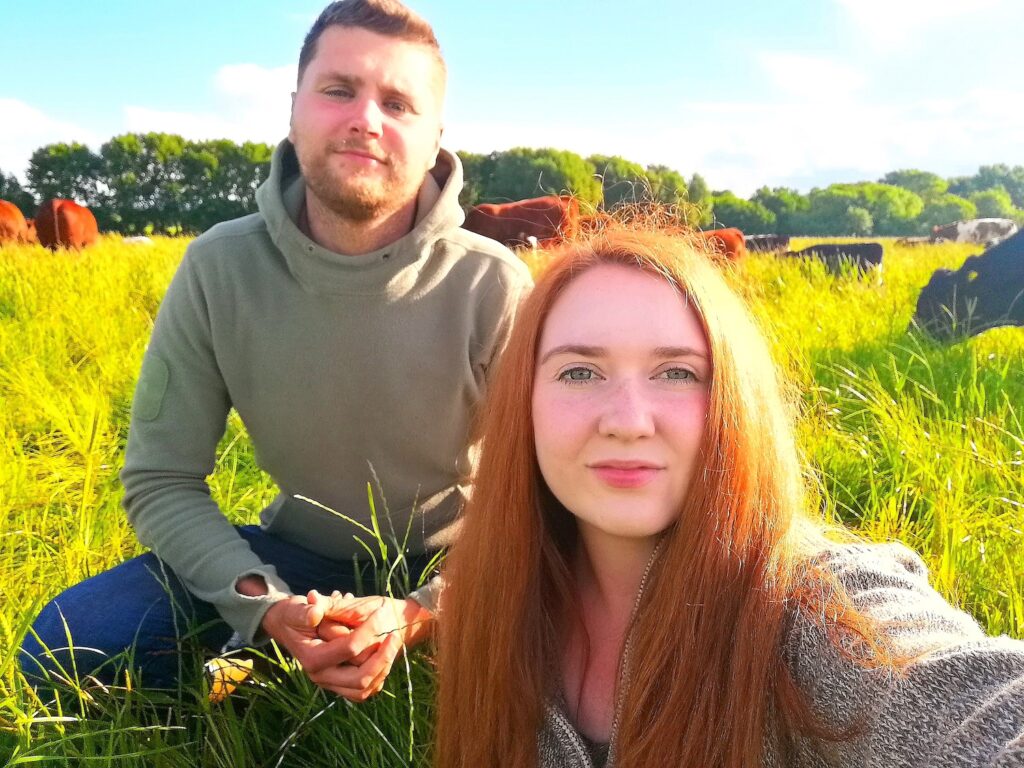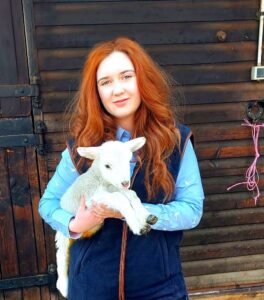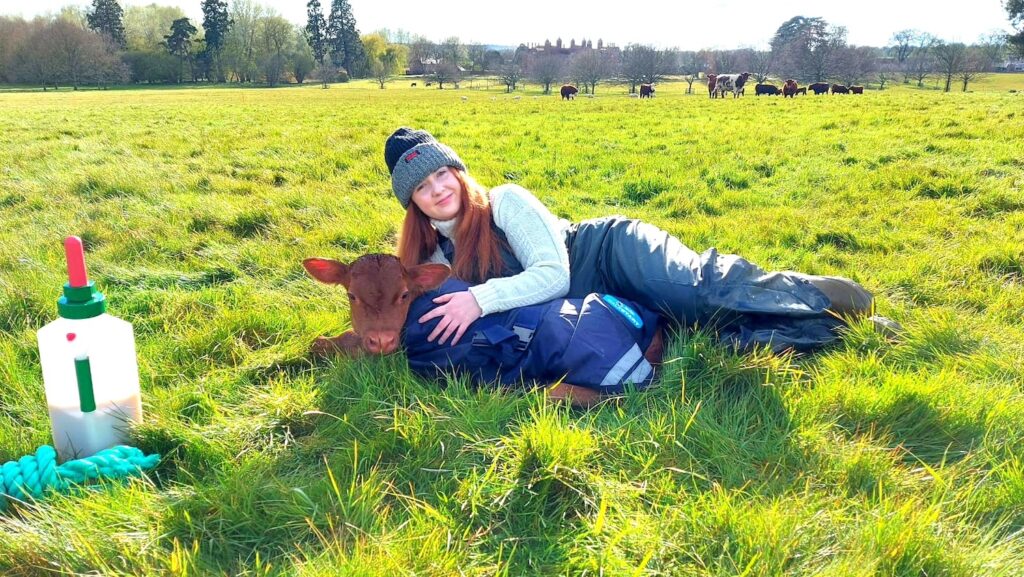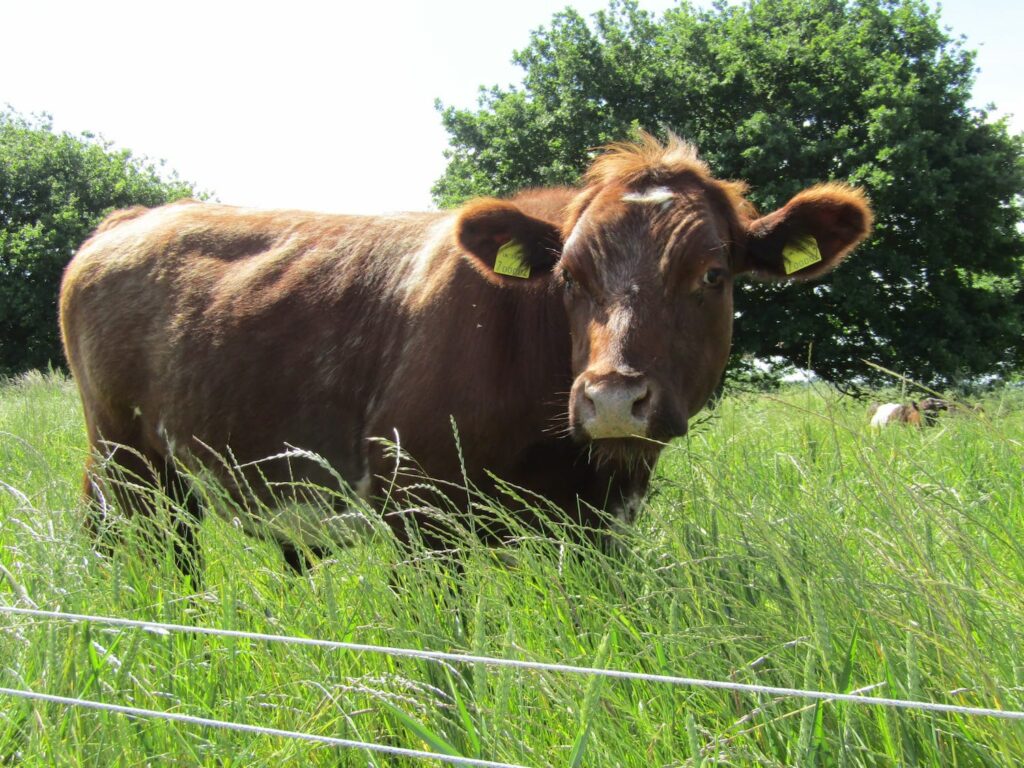Suffolk couple share their story of a challenging first year in farming
27th February 2023
Having found a shared ambition for farming when they met on a dating app, Abbie Bryant and Andy Moye are coming to the end of their first year as full-time farmers – and it’s been a challenging introduction to say the least.
Abbie, 28 and Andy, 26, farm 37ha of land in Long Melford, Suffolk, with some additional grazing sites in the local area. They have around 50 head of cattle – all native breeds including Shorthorns, Galloways, Red Polls and various native crosses – and 40 Wiltshire horn sheep.
The couple, who farm under A&A Livestock and are strong advocates for regenerative agriculture, have now added egg production to their repertoire, currently keeping 40 chickens. All meat and eggs from the farm are sold direct to local people.
Since starting their full-time farming journey about a year ago, like most farmers, Abbie and Andy have faced a range of challenges – including the summer 2022 drought and rising input costs, which forced them to take on part-time jobs in addition to running the farm. We caught up with Abbie to find out more about her year…
Q. What have been your biggest challenges over the past year?
A. I raised some orphan lambs last year and it was my first time doing so. Everyone told me it was going to be hard work and it certainly was! I found the lack of sleep and the constant feeding routine very challenging. Although it was lovely to watch them grow and flourish, I’m not sure I’d do it again!
A lot of farmers struggled last year with the drought – I know we did. We had to keep our animals moving onto fresh grass, although a lot of the grass was dying. It was challenging and we couldn’t wait for rain, which thankfully came in time for us to get some grass growth before winter.
Also, the cost of everything has gone up and, as farmers starting from scratch, it was difficult for us financially. We had to be careful with money and both got part time jobs at a local vineyard to help. This obviously limited time for us to work on the farm and meant we had to get much better with time management.
Q. Has it been difficult to start an egg enterprise given the difficulties with energy costs and avian flu?
A. The way we run our chickens means this hasn’t affected us as badly as some. We’re fortunate enough to have had a system that already contained our birds in a massive outdoor run. The price of chicken feed going up has affected us, however. We’ve needed to up our eggs prices to be able to afford feed. Having said that we are very much looking forward to when the [housing order] is lifted.
Q. Regen ag is an important part of your business. How is this journey going?
A. We still fully support and farm using regenerative practices. We use a mixture of grazing techniques depending on the weather and season. Our aim is to heal the soil and encourage biodiversity. We fence and graze a hectare at a time – our cattle and sheep know the drill and easily move from one paddock to the next. We tend to graze that paddock for a few days before we move them into the next paddock. This prevents over grazing and encourages the plant life to continue to grow – as well as spreading organic matter across the land.
We graze sheep and cattle together as they’re dead-end hosts for each other’s parasites as well as having different grazing styles. We also outwinter our stock and only feed grass and hay.
Q. Do you sell your eggs and meat straight from the farm? What are the pros and cons of this?
A. We sell our eggs in our local village and our beef and lamb directly to the public – only to those who are local to Suffolk. We are very lucky and grateful that a lot of our customers follow our journey through our social media pages, Facebook A & A livestock and Instagram a_and _a_livestock. When we have meat available, we advertise it on our social media platforms.
This has worked extremely well for us as our customers can see where their food comes from via our media pages and follow our journey. Being able to set the price and do all the marketing and selling ourselves really gives us freedom and control over our produce.
Unfortunately, being a new business and still small scale, we find we struggle to meet demand which is a nice problem to have. Also, not everyone uses social media so this leads to missing out potential customers.
Q. You have over 16,000 Instagram followers. Were you surprised by the following you’ve amassed?
A. I originally started an Instagram page as I’d seen other people not from a farming background showcasing their journey into farming, so I decided to do the same. We have a mix of followers, some from farming backgrounds, some people wanting to get into farming. I know our fantastic customers keep up to date with our pages. Part of the reason for posting on social media is that we want to connect people to where their food comes from.
We’ve been surprised and humbled by the following we’ve gained. I love getting messages from people asking for advice on how to start their farming journey because I like to use the page to encourage others to get into the industry and follow their dreams like we did.
Q. What are your plans for 2023 and beyond?
A. We have big plans to expand our grazing and our livestock numbers. We’d love to hatch more chickens and build our egg production numbers. Regenerative farming is still key within our ethos and how we plan our future in farming, so to keep learning and exploring new ways to improve our system is very important to us.
We plan to have more beef, lamb and eggs for our customers available more regularly all year round. Getting a milk cow, ducks and some pigs for ourselves is definitely on the agenda as being self-sufficient is something that we both want to achieve.
In the next few years, we are planning to buy some land of our own to slowly build up our own grazing and farm. We plan to keep updating and posting on our social media to encourage others to follow their dreams and connect people back to where their food comes from.




